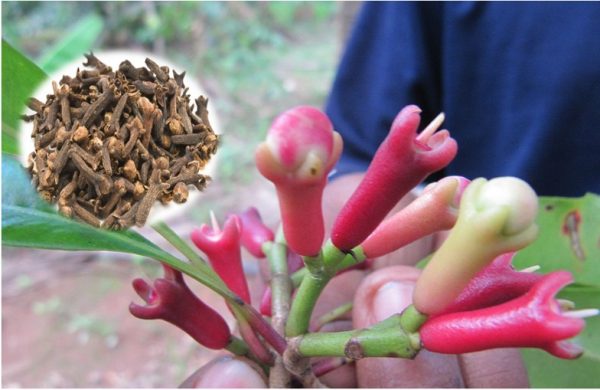
Ways To Use Clove In Home Remedies
Clove is a powerful spice widely used in Indian home remedies for its antibacterial, antifungal, anti-inflammatory, and analgesic properties. Do you know it belongs to the same family as Guava and Eucalyptus! Clove is a fragrant spice commonly used in culinary, medicinal, and therapeutic practices. It comes from the flower buds of the clove tree and is rich in bioactive compounds that contribute to its powerful health effects.
What makes clove unique in-home remedies? Different chemical compounds present in clove exhibit various curing properties.
- Eugenol: Primary active compound (~70–85% of clove oil). Anti-inflammatory, analgesic, antiseptic, antioxidant, and antimicrobial.
- Beta-caryophyllene: Anti-inflammatory and may interact with cannabinoid receptors (known as CB2).
- Tannins: Astringent and antimicrobial; contribute to digestive support.
- Flavonoids: Like kaempferol, quercetin are present in clove responsible for its antioxidant and anti-inflammatory properties.
- Saponins: Immune-boosting and cholesterol-lowering potential.
- Triterpenoids: Preliminary studies show that clove is also an anti-cancer agent and helps in boosting liver function.
1. Clove for toothache: The main active compound in clove – Eugenol is a natural anesthetic and antiseptic.
- You can keep one clove on affected tooth and bite it slow and gently. Or crush a clove and put it in cotton and place it in affected tooth.
- Alternatively, apply clove oil (diluted with a carrier oil like coconut oil) directly to the aching area.
2. Clove for cold and cough: Clove helps in relieving throat irritation, acts as an expectorant, and has antimicrobial properties.
- Dry roast 2–3 cloves and crush them. Mix with a spoon of honey and take it before bedtime.
- Or boil cloves in water with a pinch of turmeric and drink when it is warm.
3. Clove for bad breath (halitosis): Clove kills odor-causing bacteria and freshens breath.
- Chew 1–2 cloves after meals or use clove-infused water as a natural mouthwash.
4. Clove for respiratory relief (asthma, bronchitis): For those who suffer from asthma or bronchitis clove acts as a natural decongestant and has bronchodilator effects.
- Boil cloves with few Tulsi leaves (holy basil), ginger, and black pepper to make an herbal tea.
5. Clove for indigestion and bloating: Reason is, Clove stimulates digestive enzymes and helps reduce gas.
- Mix clove powder with a little honey and take it after meals.
- Or add few cloves while brewing herbal teas like cumin-coriander-fennel tea.
6. Clove for fever: Do you know clove helps reduce inflammation and boosts immunity?
- Mix clove powder with honey and black pepper. Take it twice daily during mild fever or viral infections.
7. Clove for skin infections and acne: Clove is antibacterial and helps reduce inflammation.
- Apply a paste of clove powder and honey to pimples.
- Dilute Clove oil with coconut or other carrier oil (1 drop clove oil and 10 drops of carrier oil) can also be dabbed on acne spots.
Precautions:
- Always dilute clove oil before using it on skin or gums. And
- Avoid overuse, especially in children or during pregnancy.
- Consult a healthcare professional for persistent or serious conditions.
Image credit:
Author: Sumana Rao | Posted on: May 29, 2025
« Home Remedies For Asthma Trikatu For Weight loss, Digestion and Overall Health »






















Write a comment